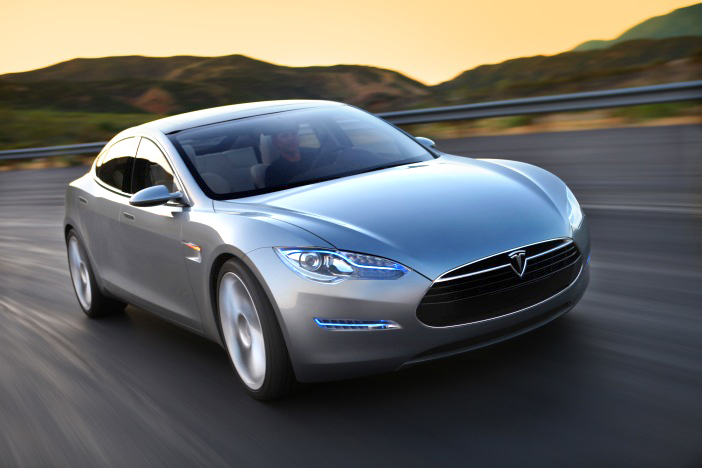Last week, Scott Woolley published a piece in Slate with the headline, “Tesla was worse than Solyndra.” It argued that the U.S. government, by not insisting that its loan be repaid in part with stock options, left money on the table when Tesla broke big — more money than it lost in the Solyndra deal. Thus, “worse than Solyndra.”
Yeah, it’s a goofy argument, as immediate pushback from Brad Plumer and Will Oremus illustrated. Woolley says it began as a tweet, and honestly it should have remained one, as it is about tweet deep. But it’s exactly the kind of flashy argument designed to catch the attention of the business media, which is primed to believe anything bad about government loan programs.
Anyway, Bloomberg TV invited me on to discuss it. The last-minute nature of the request left me unable to prepare with my usual impeccable grooming, so here I am, shaggy and oddly bloated (I don’t think my face is that fat in real life):
[protected-iframe id=”4be09f0c3ff062302505a8caea48dd29-5104299-30178935″ info=”http://player.ooyala.com/player.js?embedCode=lheWMyYzpaQGWE9HZqwTC3brHQwe90hX&playerBrandingId=8a7a9c84ac2f4e8398ebe50c07eb2f9d&” width=”470″ height=”264″]
Ugh. Everything about the framing of the segment is awful. Tesla and Solyndra are not the sum total of the government’s loan programs, or even a fair representation thereof. Taxpayers didn’t get screwed; they got paid back, with interest. The whole thing is geared for sensationalism.
Originally it was supposed to be a 10-minute segment, but there was (I kid you not) “breaking news from the fed” that pushed us back and cut us down. As a result, you can see me launching into an argument that requires several minutes of background, getting cut off, and, overall, offering up some pretty piss-poor television.
Anyway, I don’t want to spend too much time on this, but just a few words to redeem this performance.
It’s easy to say in retrospect, as Woolley does, that the government should have bought options in Tesla. Now taxpayers would have $1.5 billion, and who wouldn’t want that? But it misses all sorts of things.
First, as I tried briefly to say on the boob tube, being an equity investor is very different from being a provider of low-cost debt. There’s a whole different set of goals and incentives. An equity investor wants rapid quarter-on-quarter growth, cost-cutting (often through layoffs), and the crushing of competitors.
All of those work against the government’s goals with the loan program. The government wants stable, sector-wide growth. That’s the main goal. More specifically, it wants to be repaid. That’s why the government actually did stipulate that some repayment come in the form of options … unless the loan was repaid early. The whole point was to incentivize repayment.
Again: The point of the government’s intervention here is to make the economics of various projects and companies in these important sectors more attractive. That’s it.
Second, it’s easy to say now that the government should have demanded options, but if it had done so, it would have changed the economics of the deal. It wouldn’t have been the same deal. Remember, one of the paramount goals of the loan program was to attract private capital to the clean-car sector, and it worked — it attracted between $4 and $8 for every dollar loaned. If government loans entailed appropriating a big chunk of stock value in the event of success, they would attract less private capital.
Woolley is trying to set up a tension here between Tesla investors and taxpayers, but the whole point of the loan program was to get more money into this sector. The fact that $1.5 billion is now in the hands of private investors rather than taxpayers is a feature, not a bug.
Finally, there’s a word for government appropriating revenue from private companies: a tax. Woolley is proposing a tax that would have drained $1.5 billion in value from Tesla. Now, don’t get me wrong, I’m the farthest thing from an anti-tax ideologue. I love taxes! Woo taxes! But if you’re proposing a new tax, specifically targeting newly successful companies in nascent, strategically important economic sectors seems like the worst possible way to do it. Like economists are always saying: Tax what you don’t want, not what you do want. We want more success and growth in the electric car industry. So why would we tax it? If we need more revenue to fund cleantech loan programs, here’s a thought: Raise it with a tax on fossil fuel companies!
Anyway, this is a vaporware argument that will be forgotten by all concerned within the week. Mostly it serves to illustrate how eager some people are to believe the worst about government efforts to stimulate the clean economy. Tesla is an unmitigated public-private success story. No asterisk needed.



